Found 254 resources.
0
0
0

This paper analyzes why SNAP benefits are inadequate, reviews the body of research showing positive effects from more adequate SNAP benefits, and offers key policy solutions to improve benefit adequacy.
Topics: Food insecurity, Health, Legislation & Policy, Low-income, Nutrition, Research
 Shared by Housing Is
on Jun 11, 2019
Shared by Housing Is
on Jun 11, 2019 0
0
0
In the United States, more than 2.7 million grandparents report that they’re primarily responsible for their grandchildren under 18. The problem is many are struggling with food insecurity because of federal rules and regulations.
Topics: Child welfare, Food insecurity, Legislation & Policy, Low-income, Nutrition
 Shared by Housing Is
on Jun 11, 2019
Shared by Housing Is
on Jun 11, 2019 0
0
0

A new report by Chapin Hall at the University of Chicago finds that youth homelessness has its origins in early family experiences, including family homelessness. The findings make painfully clear that housing alone is insufficient to prevent and “end” youth homelessness, and that addressing youth homelessness alone, without explicit connections and fervent attention to family homelessness, will result in continued homelessness for all populations.
Topics: Early childhood, Homelessness, Housing, Legislation & Policy
 Shared by Housing Is
on Jun 5, 2019
Shared by Housing Is
on Jun 5, 2019 0
0
0
Protecting and improving the health of pregnant and postpartum women, infants, and young children is critically important. Those eligible for WIC — and frequently their communities and the nation — are facing levels of poverty, food insecurity, inadequate dietary intake, obesity, and ill health that are far too
high. Research shows that WIC can help to alleviate these problems for children, mothers, and their families, and improve overall health and well-being. Yet the program is reaching far too few eligible people: only 3 out of 5. Increasing access to and strengthening WIC is essential to...
Topics: Early childhood, Family engagement, Food insecurity, Funding, Health, Legislation & Policy, Low-income
 Shared by Housing Is
on Jun 3, 2019
Shared by Housing Is
on Jun 3, 2019 0
0
0
Community eligibility allows high-poverty schools and school districts to offer free meals to all students, and it eliminates the need for household school meal applications. A key piece of the Healthy, Hunger-Free Kids Act of 2010, community eligibility was phased in a few states at a time before it was made available to schools nationwide in the 2014–2015 school year.
Topics: Child welfare, Education, Food insecurity, Legislation & Policy, Low-income, Nutrition, Out-of-school time, Research
 Shared by Housing Is
on Jun 3, 2019
Shared by Housing Is
on Jun 3, 2019 0
0
0
A rule proposed by the Department of Housing and Urban Development may allow single-sex shelters to turn away trans people.
Topics: Homelessness, Housing, Legislation & Policy
 Shared by Housing Is
on May 30, 2019
Shared by Housing Is
on May 30, 2019 0
0
0

Policymakers, academics and criminal-justice reformers all agree that access to education is both a front-end and back-end tool that decreases crime, increases social and economic mobility and supports informed, engaged citizenship. Not only is high-quality education effective, it is a lot less expensive than the cost of mass incarceration.
Topics: Criminal justice, Education, Legislation & Policy
 Shared by Housing Is
on May 30, 2019
Shared by Housing Is
on May 30, 2019 0
0
0
Access to affordable child care can be a major barrier for low-income parents who want to participate in education and training activities to gain skills or obtain employment. Child care assistance from the Child Care and Development Fund (CCDF), the federal block grant that funds states to provide child care assistance to low-income families, can help alleviate this barrier and make it easier for low-income parents to participate in activities that improve their skills and lead to stable employment with adequate pay. However, the CCDF eligibility requirements and priorities for service are...
Topics: Child welfare, Early childhood, Education, Legislation & Policy, Post-secondary, Research, Workforce development
 Shared by Housing Is
on May 30, 2019
Shared by Housing Is
on May 30, 2019 0
0
0

After natural disasters, recovery efforts tend to lift up those who have resources to bounce back quickly, but cement poverty for those with modest means.
Topics: Funding, Legislation & Policy, Low-income, U.S. Territories
 Shared by Housing Is
on May 29, 2019
Shared by Housing Is
on May 29, 2019 0
0
0
Amid attacks on several food security programs from the Trump administration, this proposed change could ignite yet another debate about where we draw the line.
Topics: Food insecurity, Legislation & Policy, Low-income, Nutrition
 Shared by Housing Is
on May 28, 2019
Shared by Housing Is
on May 28, 2019 0
0
0
On May 20, the Brookings Metropolitan Policy Program and George Washington University’s Center for Washington Area Studies (CWAS) co-hosted an event to discuss housing growth and affordability in the Capital Region. The event started with the presentation of a new report by CWAS Director Leah Brooks. An expert panel discussed what local governments, developers, and affordable housing advocates can do to make sure the region meets the housing needs of all its residents.
Topics: East Coast, Housing, Legislation & Policy, Research
 Shared by Housing Is
on May 28, 2019
Shared by Housing Is
on May 28, 2019 0
0
0
Child poverty is an urgent and preventable crisis. Solutions to child poverty already exist if we just expand and invest in them. Benefits like nutrition assistance, housing vouchers and tax credits helped lift nearly 7 million children out of poverty in 2017, but millions of children were left behind due to inadequate funding, eligibility restrictions and low wages. We can and must fix these problems to help more children escape poverty now.
Topics: Child welfare, Dual-generation, Early childhood, Food insecurity, Funding, Housing, Legislation & Policy, Low-income, Research, Workforce development
 Shared by Housing Is
on May 28, 2019
Shared by Housing Is
on May 28, 2019 0
0
0
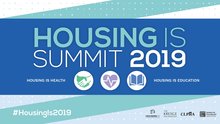
Senior Advisor John Bravacos will reflect on HUD’s efforts to work across agencies and sectors to improve life outcomes for low-income people.
Topics: CLPHA, Housing, Legislation & Policy, Partnerships
 Shared by Housing Is
on May 24, 2019
Shared by Housing Is
on May 24, 2019 0
0
0
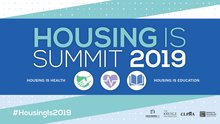
A landmark National Academies of Sciences report commissioned by Congress concludes that childhood poverty in the U.S. could be cut in half within a decade with appropriate action. The report culls through the existing evidence-base to identify the most impactful existing policies including the Earned Income Tax Credit (EITC) and housing assistance. This panel will also discuss promising new policies that if enacted could help reduce poverty such as the child allowance.
Topics: Child welfare, CLPHA, Housing, Legislation & Policy, Low-income, Partnerships, Research
 Shared by Housing Is
on May 24, 2019
Shared by Housing Is
on May 24, 2019 0
0
0
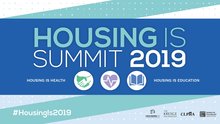
Congresswoman Barbara Lee, long-serving progressive leader and member of the Budget and Appropriations Committee, and Co-Chair of the Democratic Policy and Steering Committee, will give remarks on congressional efforts to reduce child poverty.
Topics: Child welfare, CLPHA, Legislation & Policy, Low-income, Partnerships
 Shared by Housing Is
on May 24, 2019
Shared by Housing Is
on May 24, 2019 0
0
0
Although today’s U.S. labor market is strong and unemployment is low, many working-age American remain marginalized. As communities across the country grapple with the challenges of an ever-evolving labor market, this report provides a framework for local leaders to grow good jobs through industrial development strategies that are based on their regions’ unique capabilities.
Topics: Asset building, Community development, Legislation & Policy, Workforce development
 Shared by Housing Is
on May 24, 2019
Shared by Housing Is
on May 24, 2019 0
0
0
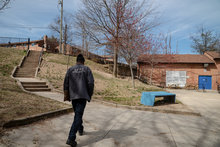
Mold. Leaks. Rodents. Crime. These are just some of the things the nation's 2 million public housing residents have to worry about. Many of the buildings they live in have been falling into disrepair for decades. Public housing officials estimate that it would cost $50 billion to fix them up. But the Trump administration wants to eliminate the federal fund now used to repair public housing in favor of attracting more private investment to fix up and replace it.
Topics: CLPHA, Funding, Housing, Legislation & Policy, Low-income
 Shared by Housing Is
on May 20, 2019
Shared by Housing Is
on May 20, 2019 0
0
0

A decade from now, most middle-income seniors will not be able to pay the rising costs of independent or assisted living.
Topics: Health, Legislation & Policy, Low-income, Seniors
 Shared by Housing Is
on May 20, 2019
Shared by Housing Is
on May 20, 2019 0
0
0
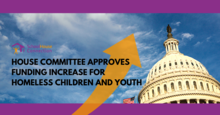
On May 9, the House Appropriations Committee passed its FY2020 appropriations bill for Labor, Health and Human Services, and Education. The House bill includes $100 million in FY2020 funding for the McKinney-Vento Act’s Education for Homeless Children and Youth (EHCY) program. This represents a 7% increase over the FY2019 level; if enacted, it would represent a 30% increase in EHCY funding since FY2017.
Topics: Child welfare, Funding, Homelessness, Housing, Legislation & Policy
 Shared by Housing Is
on May 15, 2019
Shared by Housing Is
on May 15, 2019 0
0
0
Low- and moderate-income families in Puerto Rico would get a significant income boost from the Working Families Tax Relief Act, which would substantially expand the Child Tax Credit (CTC) in Puerto Rico as well as nationally and also help the Commonwealth expand its own, recently implemented Earned Income Tax Credit (EITC). The bill, which Senators Sherrod Brown, Michael Bennet, Richard Durbin, and Ron Wyden introduced recently, would reduce poverty and increase economic security for millions of working families in the United States, including Puerto Rico.
Topics: Child welfare, Legislation & Policy, Low-income, U.S. Territories
 Shared by Housing Is
on May 15, 2019
Shared by Housing Is
on May 15, 2019 0
0
0

The Trump administration is proposing regulatory changes that could result in cuts in federal aid to millions of low-income Americans.
Topics: Food insecurity, Legislation & Policy, Low-income, Medicaid / Medicare
 Shared by Housing Is
on May 14, 2019
Shared by Housing Is
on May 14, 2019 0
0
0
On May 9, the Brookings Institution hosted an event to discuss the subsequent report, “A Roadmap to Reducing Child Poverty.” The event featured comments from Greg Duncan, who served as Chair of the Committee on Building an Agenda to Reduce the Number of Children in Poverty by Half in 10 Years, as well as a panel discussion on the report, its recommendations, and barriers to implementation. A second panel highlighted national and state policy perspectives of the consensus study report.
Topics: Early childhood, Funding, Housing, Legislation & Policy, Low-income, Research, Youth
 Shared by Housing Is
on May 13, 2019
Shared by Housing Is
on May 13, 2019 0
0
0
The pilot program aims to boost housing affordability and equity in Minneapolis.
Topics: Housing, Legislation & Policy, Low-income, Midwest
 Shared by Housing Is
on May 9, 2019
Shared by Housing Is
on May 9, 2019 0
0
0

A new study shows that Miami’s affordable housing crisis is so dire, the city needs at least 50,000 units just to meet the existing need. But the Connect Capital Miami Report, which was released Monday, also reveals a combination of tools and resources that could help alleviate the dearth of housing for cost-burdened residents.
Topics: Funding, Housing, Legislation & Policy, Low-income, Research
 Shared by Housing Is
on May 7, 2019
Shared by Housing Is
on May 7, 2019 0
0
0
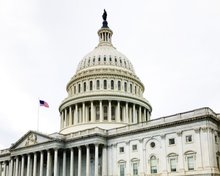
Spring is in full bloom in Washington, D.C., and so are key pieces of legislation that FRAC is monitoring and weighing in on. Below is an overview of legislative proposals in the 116th Congress to look out for that would impact critical anti-hunger and anti-poverty programs.
Topics: Asset building, Food insecurity, Legislation & Policy, Nutrition, Seniors
 Shared by Housing Is
on May 6, 2019
Shared by Housing Is
on May 6, 2019 